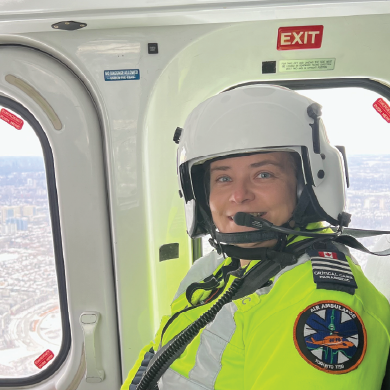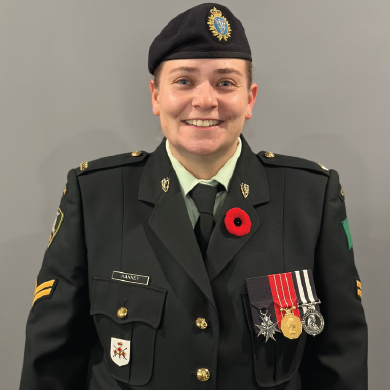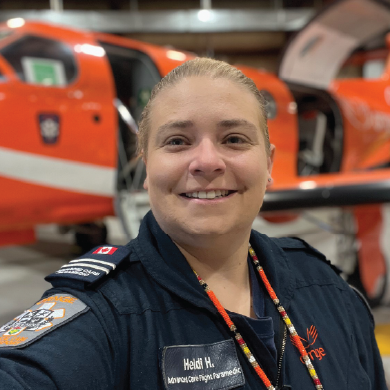Staff Profile: Heidi Hanney – Critical Care Paramedic
May 14, 2025
14 May, 2025
|
Toronto
|
By: Par: Justyn Aleluia
Meet Heidi Hanney, a Critical Care Paramedic at our Toronto Base. We recently spoke with Heidi, who discussed her time with Ornge, her professional journey, and her experience working at 13 out of Ornge’s 14 bases!
Can you begin by introducing yourself, how long you’ve been at Ornge, and your current role at Ornge?
My name is Heidi Hanney. I have been with Ornge since 2017, and I am currently a Critical Care Paramedic at the Toronto base.
Besides Ornge, what are some other positions you have held?
When I first started, I was a Primary Care Paramedic for the Weeneebayko Area Health Authority on the James Bay Coast. I was there for three years and then went to the city of Kawartha Lakes for two years. I then did my Advanced Care Paramedic certification at Georgian College and joined Ornge.
Bay Coast. I was there for three years and then went to the city of Kawartha Lakes for two years. I then did my Advanced Care Paramedic certification at Georgian College and joined Ornge.
During your time with SkyCare, you worked with Ornge on transports. Can you describe the partnership between Ornge and SA Carriers and the importance of that relationship?
I’ve been with SkyCare for about five years on a casual basis which is one of Ornge’s Standing Agreement Carriers. At SkyCare we can move patients that require advanced care. We’re doing essentially the same thing that we do at Ornge, just on a different plane. We do a lot of bariatric transports because the plane can move a larger weight and size. With SkyCare, we often collaborate with the Operations Control Centre to coordinate with different crews and logistical elements. Sometimes we would have an Ornge crew come with us to provide a higher level of care.
What is the connection/overlap between your time at Ornge and your time as an Army Reservist? What do you get out of blending paramedicine and Army communications?
 I’ve worked part-time with the Department of National Defence as a reservist for the last 14 years with Canadian forces. I do anything involving signals. I think it’s neat to do something different aside from paramedicine. I do a lot of things with radios in the reserves so it’s good exposure to how things work. When Ornge began using new radios, I was able to go around the base and help train people on how to use them.
I’ve worked part-time with the Department of National Defence as a reservist for the last 14 years with Canadian forces. I do anything involving signals. I think it’s neat to do something different aside from paramedicine. I do a lot of things with radios in the reserves so it’s good exposure to how things work. When Ornge began using new radios, I was able to go around the base and help train people on how to use them.
I understand you were a Provincial Float Medic, what other bases have you worked at?
I’ve worked at every base so far except for Chatham-Kent. I have had the opportunity to transport patients on land ambulance, rotor-wing, and fixed-wing. I had exposure to all of Ontario and got to meet so many different people.
What are the differences in providing healthcare in those different areas?

A lot of remote communities require fixed-wing transports and there are a lot more logistics that go into coordinating them. Sometimes we land and require transport from the runway to the community via cab or whatever transportation the local nursing station offers. In these transports, you are with the patients for a lot longer and get to develop a better rapport with them because of that.
Can you speak about the education and training opportunities offered here at Ornge?
The opportunities are endless, that was one thing that really attracted me to Ornge. There are endless opportunities for training or learning new things and there is always continuing medical education. There are plenty of office hours and seminars and so many chances to pursue higher education.
What is the most important lesson you’ve learned during your time here?
The most important thing I have learned is the dynamics of patient transport. There are a lot of logistics that go into each transport, and a lot needs to happen to make the patient comfortable and to do what is best for them. Lots of things happen in the background and it requires a big team to move a patient safely across the province.
Who or what are some of your biggest inspirations in your career?

Early on, being able to witness some of the CCPs work in high-stress situations was phenomenal. At that point, I didn’t realize that was something that I could aspire to do one day. That’s when I pursued that path, and I learned some tips and tricks from people who had years of incredible experience within the organization.
What motivates you to continue in your role?
I love the fact that every day is different. There are never two days that are alike, and you never know what you’re going to do each day. Recently, I’ve been enjoying the opportunity to teach some students who have come through the base and pass on knowledge that I learned when I first started.
You’ve worked at almost all of Ornge’s bases, are there any experiences or environments that have stuck out the most?
All bases have unique challenges and opportunities, and I appreciate the differences between each of the bases. A base like Sudbury had a strong mix of trauma and medical calls whereas some other bases tend to lean to one having a higher volume of one type of call versus the other. Thunder Bay was great too since they had fixed wing and rotor-wing aircraft. There were some shifts that I would start on rotor-wing and then finish with a fixed-wing call. But like I said, I loved working at all the bases and the different challenges and assets that I got to experience with each one.